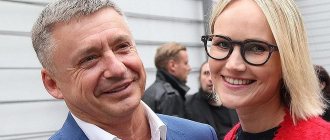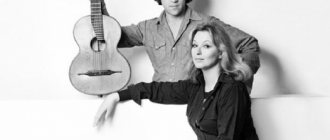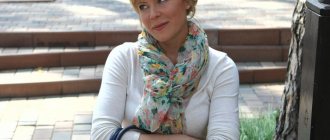Marina Zudina is 54. How she lives after Tabakov’s death and why she left the theater
In September 2020, Marina Zudina will turn 55 years old. Two years ago, she became a widow when Oleg Tabakov, with whom she had lived together for almost 35 years, passed away.
“I used to introduce myself: “This is Marina Zudina, Oleg Pavlovich’s wife.” I was proud to be his wife. Now I just say: “This is Marina Zudina,” said the actress.
What else does Marina Zudina have to get used to at this new stage of her life?
Everything worked out magically
When Marina Zudina was 16 years old, she managed to fulfill her dream - to enroll in GITIS on the course of Oleg Tabakov. At that time, the girl had not even had time to pass her final exams at school, but she had already successfully overcome the competitive selection process, receiving straight A’s in the entrance exams.
“Apparently, such incredible strength was the conviction that the dream of studying with Tabakov would come true. Although if you soberly understand that chain of coincidences, you understand that what happened was out of the realm of the impossible. Everything worked out magically,” the actress recalled.
Marina Zudina admits that only Oleg Tabakov could break the rules like that and admit her even without a certificate. He largely influenced the formation of Zudina not only as an actress, but also as a person. According to the actress’s recollections, during her student years everyone was in love with Tabakov: cosmic love, as defined by Zudina herself, did not pass her by.
Photo from Marina Zudina’s personal page on Instagram @marinazudina_official
The actress characterizes the beginning of their relationship as “an explosion of emotions.” Zudina and Tabakov got married 10 years later, and another 20 years later they got married. In the program “The Fate of Man,” when her husband was still alive, the actress said:
“I still understand the distance between us. Life did not shorten the distance. I still feel its scale. Oleg Pavlovich is the person who has never disappointed me.”
Two children were born into the family: in 1995, a son, Pavel, and in 2006, a daughter, Maria.
The path from cinema to theater and back
Marina Zudina's film career began in 1984, when she starred in the film “I Still Love, I Still Hope.” Then there was the film “Valentin and Valentina”, where the actress played one of the main roles. The audience loved the film; Zudina recalls the heaps of letters that fans wrote to her. The actress says about her participation in this project that it was there that she played herself.
Photo from Marina Zudina’s personal page on Instagram @marinazudina_official
Now her filmography includes 40 films. Among them: “After the Rain on Thursday”, “The Noble Robber Vladimir Dubrovsky” and “Yesenin”.
For a long time, Marina Zudina positioned herself exclusively as a theater actress, but now she is gradually returning to cinema. One of her last works was her role in the series “Kept Women”, the first season of which was directed by Konstantin Bogomolov. Before, Zudina and Bogomolov already had joint projects, but in the theater.
At 54 years old, the actress is in excellent shape.
“I believe that, in principle, we have a profession that requires you to keep yourself in shape. But I didn’t do anything special for the role. It just seems to me that if you are determined to work, then the body itself understands what it needs. That is, it doesn’t happen that I don’t keep myself in shape, but before doing any work I need to quickly get into this shape,” she shares her beauty secrets.
Photo from Marina Zudina’s personal page on Instagram @marinazudina_official
Now Marina Zudina pays more attention to cinema, although earlier, by her own admission, the theater was the main thing for her.
“I did not consider the theater as a place of work; for me it was a huge part of my life due to the fact that Oleg Pavlovich was the head of two theaters. Then everything in the theater was interesting to me, but now I can’t say that. Basically, I’ve played enough – in a good way, so the pause is quite natural,” she says.
Starting from scratch is good for the profession
After Oleg Tabakov passed away, his son developed a difficult relationship with the theater. Since 2020, the Moscow Oleg Tabakov Theater has been directed by Vladimir Mashkov. Pavel Tabakov left both theaters - the Moscow Art Theater and the Tabakerka - of his own free will due to the fact that he did not like the policy of the new management.
Photo from Marina Zudina’s personal page on Instagram @marinazudina_official
The artistic director of the Moscow Art Theater, Sergei Zhenovach, did not extend his collaboration with Konstantin Bogomolov, in whose new project Marina Zudina was also involved. Now the actress will play on the stage of one of the main theaters in Moscow only if old performances with her participation remain in its repertoire.
Marina Zudina reacts calmly to such changes in her theatrical career and in the career of her son, without causing scandals. Daughter Maria, according to the star mother, has not yet shown interest in the acting profession.
“Another life begins, where I learn again. And I must be a worthy and strong person in this. I haven’t acted for a long time, so I started acting. I'm starting from scratch, but this is a good quality in the profession. It’s interesting for me to live now, realizing many things anew,” says Zudina.
Photo from Marina Zudina’s personal page on Instagram @marinazudina_official
Comments
24
31
Oleg Tabakov's space
From the outside, Oleg Pavlovich’s life seems unusually successful. He was a great actor, created two wonderful theaters, loved, gave birth to wonderful children. And at the same time he always gave the impression of a very joyful, light and happy person. I only saw him dissatisfied and confused once - when he was offered to head the Moscow Art Theater. Tell me, was he really light, joyful, happy by nature, or was it a mask?
Marina Zudina: The word “dissatisfied” is inaccurate - he realized that he was shouldering the burden of responsibility for the Moscow Art Theater. “Tabakerka” was among the most successful theaters in those years. We toured a lot, all the young, talented artists wanted to work with us - just like successful directors.
I, too, was very uneasy about the fact that he would head the Moscow Art Theater. We have a family, a theater, Oleg Pavlovich is the rector of the Moscow Art Theater School - and suddenly something else arises with which we have to share his love and care! I really wanted a second child, but after Oleg Pavlovich took responsibility for the Moscow Art Theater, I gave up this idea for almost five years. I understood that I had to be with him emotionally.
Oleg Pavlovich did not create the image of a happy person, but was like that. He loved life in all its manifestations and was very down to earth in the good sense of the word. You called me a comrade-in-arms, but I was rather the woman he loved. The need to love and be loved also determined his sense of life. Family was very important to him, but his comrade-in-arms, the mother of his children - all this came after the woman he loved. And that says a lot about him.
There were very difficult periods in his life, but he did not delve into failures and defeats, but moved on. He was a creative person and received great joy from it. In the last years of his life, he sometimes said that it was hard for him and that he needed to leave the Moscow Art Theater. I didn’t support these conversations because I wasn’t sure it was right for him. And they loved him too much at the Moscow Art Theater to let him go. His very presence in the theater was a guarantor of stability.
He was a real master, he needed to create and build. And I can’t name anyone else in the theatrical world who would leave behind so much realness. Even if we take students, acting work, the creation of theater and new names in directing out of the equation, a lot of material remains. This is the theater on Chaplygina, and its new building on Sukharevskaya, and workshops on Izhora, and a college built on the site of a hostel, where Zhenya Mironov, Sergei Gazarov, Volodya Mashkov, and our other artists once lived. On the site of a two-story house, a luxurious building was built where children from all over the country study for free. He dreamed about this for many years. This is a monument in Kamergersky Lane to Stanislavsky and Nemirovich. Monuments to Volodin, Rozov and Vampilov - he believed that these playwrights gave a start to many artists and helped them succeed.
Reconstruction of the Moscow Art Theater, workshops built in its courtyard. Apartments for employees. The new stage of the Moscow Art Theater, which he built with private money. A branch of the Moscow Art Theater, the construction of which was achieved by Tabakov. True, the new leader almost immediately abandoned this building. The stage was built one to one, like the Moscow Art Theater, with the same parameters and technical characteristics. And in addition to the stage, apartments for employees, rehearsal rooms, rehearsal halls, decoration warehouses were planned in this building... Well, the main thing for me is that Oleg Pavlovich was happy when he built the branch. He understood that there would be another beautiful theater building in Moscow.
What did Oleg Pavlovich not accept about people, business, public life?
Marina Zudina: His attitude towards artists and directors depended on their talent; neither character nor the ability to be pleasant played a role. He could be carried away by someone’s acting personality, but if he realized that the person was not developing and the results left much to be desired, he parted ways. In both theaters, he built working relationships, and their quality depended on whether the people were reliable or not, whether they had the same “blood type.” There were no close associates at all. His circle of friends was quite narrow; most often they were business people, politicians or friends of his youth.
Oleg Pavlovich liked to repeat: “The meaning of life is that it does not end with you”
Oleg Pavlovich absolutely could not stand Stalinism and categorically did not accept any form of violence against people. I met him back in 1982, during Soviet times, and even then he had the attitude of a free person. No one could disperse the entire course and recruit students again - but he could. He could immediately accept a talented person into the third year. He pushed the boundaries of what was possible and never looked back.
Oleg Pavlovich created a space in which it was joyful, and people were drawn to him. He understood that the world was imperfect, but he changed the world around him. And the people who were next to him became better. We, his students, during Oleg Pavlovich’s lifetime were “illuminated” by him, like a spotlight, like an artist appearing on stage.
In the last years of Efremov’s leadership, the Moscow Art Theater was in a difficult situation. Oleg Pavlovich created a wonderful theater - was he himself pleased with the results?
Marina Zudina: Oleg Nikolaevich Efremov loved social theater, he was a citizen director. And Oleg Pavlovich loved theater as a spectacle and a source of emotions. But at the same time, Oleg Pavlovich always considered Efremov his teacher and valued him very much. Oleg Nikolaevich is one of the few directors who invited strong, talented directors to his theater. Oleg Pavlovich was also distinguished by this. Sometimes he invited aesthetically incompatible directors, and they felt comfortable at the Tabakov Art Theater. He knew how to trust, sometimes he filmed unsuccessful performances, but he never remade them, he always supported new things. Oleg Pavlovich never forgot that the Moscow Art Theater began as a theater of modern drama. He himself was a very modern person and even at 80 years old he was able to master the modern acting language, abandoning everything he had learned.
What has kept him going in recent years?
Marina Zudina: Our daughter Maria was a kind of battery for him. He loved her immensely, and I even joked that now I was insured against everything, “because you won’t find anyone younger than Masha.” Maria filled his emotional space very much. Of course, I am with my son, close friends and, of course, the love of everyone who worked in his two theaters. He also liked to repeat: “The meaning of life is that it does not end with you.”
“Mom, we are strong! We can handle it!”
- Marina, of course, I can’t help but ask you about another appointment - the famous director Sergei Zhenovach to the position of artistic director of the Moscow Art Theater. Chekhov.
— Sergei Vasilyevich was one of the first directors whom Oleg Tabakov invited to stage a play at the Moscow Art Theater. Chekhov. It was "The White Guard" based on Bulgakov's play. At first, Oleg Pavlovich planned to do this production in “Tabakerka”. We had a very good distribution of roles: Andrei Smolyakov, Vitalik Egorov, Mikhail Khomyakov, Denis Nikiforov and me. Zhenovach made his distribution. From Tabakov’s recommendations, he appointed only Alexander Semchev for the role of Lariosik, and chose all the other actors himself.
Question answer
Who is Sergei Zhenovach?
I really wanted to, but never played Elena in The White Guard. However, this did not stop me from falling in love with the play and appreciating the work of the director and artists, including the wonderful Natalia Rogozhkina , who played Elena Talberg.
She was wonderful there. I then watched The White Guard several times, and for my son Pavel it was one of his favorite performances.
After The White Guard, Oleg Pavlovich repeatedly offered productions to Sergei Vasilievich. But he staged at the Maly Theater and focused on his studio. I say this because Tabakov really appreciated Zhenovach’s directorial talent. Moreover: the only review that Oleg Pavlovich wrote in his life was a short article about Zhenovach’s play “Vladimir of the Third Degree” - Tabakov liked this production so much.
Therefore, will the new artistic director of the Moscow Art Theater need me? Chekhov or I won’t be needed, my sympathy for him will not change. I can only say kind words about Sergei Vasilievich Zhenovach and wish him good luck.
As for me... My daughter told me very correctly: “Mom! We are strong! We will cope, we will move on, and dad will help us.” And I believe in it.
Marina Zudina – Oleg Tabakov’s muse
Marina Zudina was born in Moscow on September 3, 1965 in the family of journalist Vyacheslav Zudin and music teacher Irina Zudina. In her early childhood, Marina and her parents spent three years in Inta, where her father was sent after university. RIA Novosti / Marina Zudina in 1988.
The actress admits that as a child no one saw any talent in her. The girl had neither hearing nor voice. Therefore, for quite a long time they did not want to take the girl into any circles. RIA Novosti / Oleg Tabakov and Marina Zudina. 1998
But in high school, Marina began to think about a career as an actress. Moreover, she wanted to learn the skill only from Oleg Tabakov. Therefore, the girl approached admission to GITIS with all seriousness. She went to classes with a phoniatrist to develop her low register, because she had problems with her voice. RIA Novosti / Marina Zudina. 2010
Oleg Tabakov paid attention to student Marina Zudina. He noted that she was able to work deeply on the role and was sure that the girl would make a good actress. RIA Novosti / Konstantin Khabensky and Marina Zudina during the play “The Seagull”. 2011.
Marina Zudina graduated from the Tabakov and Leontyev course in 1986. RIA Novosti / Marina Zudina with her son Pavel. 2011.
As a student, Marina Zudina already managed to star in several films. One of her first roles was Valentina in the film “Valentin and Valentina” by Georgy Natanson. RIA Novosti / Marina Zudina and Mikhail Barshchevsky. 2011.
At the same time, Marina Zudina played in several more films. Among them: “I still love, I still hope...” by Lyrchikov, “Personal File of Judge Ivanova” by Frez, “After the Rain on Thursday” by Yuzovsky, “On the Main Street with the Orchestra” by Todorovsky. RIA Novosti / Sergei Bezrukov and Marina Zudina. year 2013.
The press wrote about Marina that she is best able to play heroines with lyrical characters, not just good, but beautiful. RIA Novosti / Marina Zudina. year 2013.
After GITIS, Marina Zudina went to work at the Oleg Tabakov Theater Studio. The first six years the actress was unlucky. In her opinion, she lacked some meaningful roles. However, she played Tanya in the play “The Armchair”, Rowenna in “Biloxi Blues”, and Sveta in “The Roof”. RIA Novosti / Marina Zudina. year 2014.
The romance between Marina Zudina and Oleg Tabakov began in the mid-80s. At that time Oleg Pavlovich was still married. His wife was Lyudmila Krylova. Therefore, the relationship with the young actress had to be hidden. RIA Novosti / Oleg Tabakov and Marina in a scene from the play “The Seagull”. year 2014.
The secret affair lasted more than 10 years. As a result, Oleg Pavlovich nevertheless left the family, although initially there were no such thoughts. RIA Novosti / Marina Zudina. year 2014.
The family had two children. In 1995, Pavel Tabakov was born, and 11 years later Maria. Oleg Tabakov's eldest son Anton was never able to forgive Marina for his father leaving the family. RIA Novosti / Marina Zudina in 2020.
Marina Zudina is a People's Artist of Russia. RIA Novosti / Oleg Tabakov and Marina Zudina. 2020
Marina Zudina: “The most difficult thing was to play a mute American woman”
People's Artist of the Russian Federation Marina Zudina , widow of People's Artist of the USSR Oleg Tabakov, celebrates her 55th birthday on September 3. After the death of her husband, the actress did not communicate with the press for some time. But then I found the strength to live, and again began actively acting in films and giving interviews. One of the last works that Zudina presented to the audience was the sensational film by Konstantin Bogomolov - the series “Kept Women”. Marina Zudina answered questions from AiF.
Olga Shablinskaya, AiF.ru: Tamara Gverdtsiteli said in an interview that only people far from the stage consider artists to be subtle, vulnerable creatures. In fact, the profession requires you to be strong, including physically. How much of this is about you?
Marina Zudina: Of course, the artist must be in good physical shape, because a typical shooting day in today's film and television production lasts 12 hours, plus travel to and from the set. Of course, not all actors work half a day every day; it all depends on the subjects being filmed and who is needed in the frame.
Marina Zudina and Oleg Tabakov. 1998 Photo: RIA Novosti/Vladimir Vyatkin
There are overtimes up to 16 hours, but this is by agreement. There are night shifts, which is even more difficult, especially several days in a row. Sometimes you have to freeze outside, because according to the scenario it’s summer, but it’s deep autumn outside. There are pictures where difficult long-distance expeditions and difficult living conditions even for artists. I’m not even talking about psycho-emotional overload, if the story involves existing on camera at the limit of physical and emotional capabilities. Or there is simply a huge amount of text in a serial production, when they can stage at least 10 scenes in a row, and it is unrealistic to learn it all the day before, because they can shoot in the same mode the day before. Therefore, enormous concentration is needed to remember all this.
— Marina Zudina’s filmography includes about 40 films. Which job was the most difficult for you?
— For me, the most difficult project was the film “Mute Witness” by Anthony Waller , where I played a mute American woman. For two weeks we filmed at night, and from 11 in the morning I rehearsed the play in the theater.
It all ended with me not being able to enter the frame because the tears were flowing on their own. I was sent to sleep in some office at Mosfilm and given American vitamins for stress. In the morning they were able to remove something. Oleg Ivanovich Yankovsky was nearby , and it was he who asked me to let me get some sleep, because the actor’s lack of energy in the frame is unacceptable, and you can’t explain to anyone later what difficult circumstances there were. It doesn't matter!
Marina Zudina in the film “Silent Witness”, 1994. Photo: Still from the film
— Many psychologists, when a client comes to them, first of all rush to analyze not subtle psychological questions, but completely everyday ones: “How do you sleep, how do you eat?” Do you think sleep and nutrition affect your psychological state?
- Of course they influence! And, of course, it’s easier for me to arrive at the site at 10, and not at 6 in the morning, like for any artist. The most important thing is sleep! I need to get some sleep. Everything else is less important for restoring strength.
As for nutrition, I am sure that good food can restore strength and improve your mood. Of course, this is not always possible, but I am talking about the ideal. I try to have lunch not on the set, but in a restaurant, if it’s nearby and I can catch it during the break.
— Looking at you, it’s hard to believe how old you are according to your passport. Reveal the secret of what you need to do to remain active, youthful, athletic and beautiful in adulthood?
- You must love life! You must be able to rejoice! For some reason, many people lose this quality with age... We must never cease to be amazed, we must develop personally. It is most important. Because no amount of gyms or cosmetic procedures can restore your state of mind!
— Marina, I'll ask a difficult question. How did you find the strength to work and simply live after Oleg Pavlovich left?
- You know, my daughter told me very correctly: “Mom! We are strong! We will cope, we will move on, and dad will help us.” And I believe in it. All the students of Oleg Pavlovich Tabakov say that his motto was “The work must be done.” This is true. That's how he lived. He lived joyfully, loved joyfully and worked joyfully.
Marina Zudina: “Despondency? This is not about Oleg Pavlovich at all!” More details
LiveInternetLiveInternet
LAMKA_2012
all posts by the author
With Oleg Pavlovich I felt absolutely protected. Next to a strong man, this is natural. At the same time, she was never childish.
— Marina, a new film season will start soon, in which the NTV channel plans to show the series “The Good Wife.” What was the mood in which you filmed?
— It was interesting to work, the story has many twists and plot lines, and this is always attractive. I hope both the audience and we, the actors, will like it. This is a domestic version of the famous American series, essentially a copy, but with minor nuances. Without African Americans, sexual minorities and drug addicts. In our version, if the bad guy is just a drinker. These are the realities of television. They worked enthusiastically, albeit hard - long shifts, a huge amount of text stuffed with legal terms. But there was a humanly pleasant atmosphere on the site, which is not always the case. Based on the casting, it seems to me that the hits were quite accurate. Dmitry Miller and I play the owners of a law office where the main character Alice comes to work. She is played by Alexandra Ursulyak.
— When relationships between colleagues don’t work out, does it really bother you?
“I’m one of those actresses who works much better in a friendly atmosphere. Recharging with negativity is not my story, I immediately close down, it’s difficult for me emotionally. If there is a conflict with your partner, it is not easy to even look you in the eye. When I was filming Pyotr Efimovich Todorovsky’s film “On the Main Street with an Orchestra” with Oleg Borisov in the title role, it turned out that outside the frame we existed in parallel. As soon as “Cut!” sounded. - as if the wall was growing.
Apparently, it was necessary to gain trust. Oleg Ivanovich is a closed person; he needed time to let people get closer to him. But for me, such a situation arose for the first time, and I took it as something personal. I decided that I probably don’t suit Borisov as a partner. But this did not last long, the barrier was overcome. And I found out that he was attracted to me after filming, when Oleg Ivanovich offered to play with him in a play based on Dostoevsky. At that time, he was moving from St. Petersburg to Moscow and was going to transfer “The Meek One” to a branch of the Moscow Art Theater. I could not count on such trust.
- But you never played with Borisov. Why?
- That's my fault. Or rather, it’s not even a mistake, but a coincidence. I was twenty years old, and I, like Tabakov’s other students, lived with a single dream - to create my own theater. I didn’t think about any other scene.
At that time, there was no practice when an actress was invited to only one role. The only time in my life when I regretted that this did not happen. After all, working with such an artist as Oleg Ivanovich Borisov is God’s gift, no less. But in my youth it seems: everything is still ahead, there will still be so many offers. Time passes, and you understand that you were given a chance, but... you didn’t take it.
In general, I believe that all turning points in life happen against our will and contrary to circumstances. And only what happens to us happens. Take, for example, my admission to GITIS for the course of Oleg Pavlovich Tabakov.
— You were accepted straight into the second year, although you had not even passed the school final exams yet.
— Apparently, there was such incredible strength in the conviction that the dream of studying with Tabakov would come true. Although if you soberly understand that chain of coincidences, you understand that what happened was out of the realm of the impossible. Everything worked out magically.
Judge for yourself. I entered the tenth and last grade when Oleg Pavlovich took a course at GITIS. And I practically came to terms with the fact that my dream would remain a dream—I wouldn’t get to Tabakov. At the end of May, when graduation was already beginning, I quite by chance met a former classmate on the street. He mentioned that Oleg Pavlovich dispersed that course, leaving three or four students, and announced an additional enrollment. I might not have known about this, as you understand, the Internet did not exist yet.
And I went to GITIS empty-handed - no certificate or any other documents. It turned out that auditions and tours were over. But I wasn’t the only one hoping for luck, there were others too. And then - this could only happen with Oleg Pavlovich - he invited us all to read the program.
I had an excerpt from Margarita Aliger’s poem “Zoe”. “Kill them, poison them, burn them! I will die, but the truth will win! - I screamed with tears in my eyes. She was so patriotic... Next came Irina’s monologue from “Three Sisters” and Mikhalkov’s fable. In general, the competition passed, I was sent for an interview. She got two A's, and that's it - without a school certificate she turned out to be a sophomore at GITIS.
All this could not happen by definition, the story told is from a series of incredible things! That’s why I repeat: what is supposed to happen happens. And we never know which path will lead to the goal.
Over the years I asked myself the question: would I have loved theater as much if it had not been for meeting the Teacher? There is no clear answer. I loved the Tabakov Theater as a space where talented directors were invited, where interesting creative ideas were given a start, where no one suppressed anyone, where people were internally free. An ideal place for joy and creativity. I would never want to play Anna Karenina for anyone.
— You worked a lot with Konstantin Bogomolov. Which other directors are you interested in?
— Of course, Tabakov himself, who worked with us for many years as a director, although he never considered himself one.
And of course everyone to whom Oleg Pavlovich gave the start: Karbauskis, Pisarev, Serebrennikov. I was happy to work with both Temur Chkheidze and Adolf Shapiro. The last six works at the Moscow Art Theater were done together with Bogomolov. And even if he and I no longer collaborate, I will remain deeply grateful in my soul. Until the end of my life I will be grateful to him for extending Oleg Pavlovich’s creative life. After all, most of all Tabakov loved to go on stage.
He and Bogomolov did wonderful work. And “The Jeweler's Jubilee,” and “The Dragon,” and “The Year I Wasn't Born.” Thanks to this director, Oleg Pavlovich discovered a new theatrical language. He, like many great artists, developed throughout his life. A child lived in him... Naivety of perception, the ability to be surprised, to enjoy new things, and not to be afraid, as often happens with age.
As for my own work in the theater, I will say this: I have never built relationships based on benefits. If a director gives a job, he’s good; if he doesn’t, he’s bad. For example, we have never worked with Evgeny Pisarev and Kirill Serebrennikov, but from a human perspective I sympathize with them.
— Marina, how many plays do you play at the Moscow Art Theater and do you expect premieres in the new season?
— I play at the Moscow Art Theater in four productions — “A Streetcar Named Desire,” “An Ideal Husband.” Comedy", "Karamazovs", "350 Central Park...". But I still remain an actress in “Snuffbox”. We, the students, created it together with Oleg Pavlovich. There was not even a question of joining the Moscow Art Theater troupe when he was running the theater. I always played as a guest actress. I don’t know how things will turn out next.
Should we expect a premiere this year... I prefer not to think about this topic. Now I'm interested in cinema, I haven't acted for many years, now I'm catching up. If they offer something worthwhile, I agree.
I’ve already talked about The Good Wife. But this is not the only work. Gennady Ostrovsky first shot a series based on his own script for the NTV channel under the working title “Wolf”. The story spans the 1940s and today. I play the wife of the diplomat Umansky, himself - the wonderful Sergei Vasilyevich Makovetsky. We first met on the set. I am fascinated and delighted by Sergei. He treated me with great warmth and tenderness. Not with just any partner could she play such a difficult dramatic role. His words that I was a sensitive partner were very pleasant.
— You didn’t mention the sensational “Kept Women.” Is there a sequel being made?
— Yes, but the director has changed, Konstantin is in charge of the project (The first part was directed by Bogomolov. — Ed.) and edits the script. People often ask how I even agreed to take part in the film. I answer - solely because it was Konstantin Yuryevich’s proposal. If I had only read the synopsis, I would definitely have refused. Everything written was beyond comprehension - from the number of characters and plot lines. And this is the first time in my practice when a script existed, but was not finally approved. Kostya was allowed to change whatever he saw fit. Scenes were added, removed, and new characters emerged. On the part of the producers, this is a sign of serious trust in the director.
— Your heroine Lyudmila Dolgacheva is married to the hero of Sergei Burunov, and she also has a young lover. There are many erotic scenes in the film, but your Lyudmila does not participate in them. Did you refuse or didn't offer?
— Explicit scenes were not offered. We limited ourselves to light eroticism and humor in our relationship with the young hero, played by Alexander Kuznetsov. As a viewer, I am calm about such scenes. This is part of everyday life... I am sure that if the actors were frank in the frame, it was certainly not because the director forced them to. And by mutual agreement and belief that for the story we are telling, this is correct.
I think “Kept Women” hooked viewers not at all with its erotic scenes; there aren’t that many of them. And because we are talking about the global feeling of loneliness that people often experience. My heroine, despite having a family, feels useless to anyone. Her husband has long lost interest in her, her lover gives her false sensations. In general, the sublimation of love...
— Recently, one famous artist of fifty years old published a post in a swimsuit and asked subscribers how to live if they offer the roles of mothers of heroes? How did you find the transition to older roles?
— Age transitions occur smoothly in life. At seventeen, it seemed that a woman after thirty did not arouse interest in the opposite sex. And now I’m thinking: what can a smart, mature man talk about with a twenty-year-old? Of course, I guess that grown men do not need young girls for conversations about the meaning of life. But nevertheless, pauses need to be filled with something... Talking and knowing that you are understood is very important.
Yes, I am not happy with the number of wrinkles around my eyes, yes, I see how the last two years have left a real imprint on my face. But what to do? As the heroine of Chekhov’s “The Seagull”, Arkadina, whom I play, said: “I never think about old age or death. Which have not be avoided".
Sometimes I think about all this, but I don’t suffer about it. It's inevitable. And I’m not afraid of death either, it’s just a transition to another dimension.
— I would like to understand what you are like, Marina Zudina, in life. Which of your recent roles is most about you?
— Perhaps Svetlana in The Good Wife. Like her, I am different. And tough, and tender, and vulnerable. She, like me, constantly solves problems. How can you explain what I am like, and why? Oleg Pavlovich once said: “You are earthly.” At first I didn’t understand how it was?.. And then I figured it out: yes, I am earthly, not ephemeral. Although for many years I had the “correct” image on the screen, like Alyonushka. Remember the movie "Valentin and Valentina". What was it like in the Soviet years?
Don't stand out, don't stick out, be more modest. But I don't like correctness. I repeat: I am different. Sometimes very tough. One day I stopped filming and explained to the director in a language he understood that I also knew profanity. But unlike him, I don’t use it just like that, in everyday life. He took everything correctly, and the atmosphere on the court became more pleasant.
If we talk about self-assessment, it is subjective. We also perceive others exclusively through the prism of subjectivity. For one you are the sweetest creature, for another you are a capricious hysteric. I never listen to what they say about someone, I prefer to have my own point of view.
— What do they most often say about you?
- Do you think I’m asking - what do they say about me? No, not interesting. When Oleg Pavlovich came to the Moscow Art Theater, they tried to start passing on gossip to me. I stopped it right away, idle talk interferes with life. By the way, we talked to Sergei Makovetsky about this topic and he said: “It’s better to make a mistake about someone, but I don’t want to know what he says behind my back.”
“You seem rather closed to me.” Do you have close friends?
— Alone, we’ve been friends for ten years. There were friends in common with Oleg Pavlovich. I never needed confidential communication with strangers, because I was filled with love for my man, children, and profession. But often friends arise along with problems that you want to share. It’s not to say that Oleg Pavlovich loved long conversations about difficulties or complaints. Since childhood, I have become accustomed to talking everything through within myself and deciding what to do. When our relationship began, and at a high emotional level, I definitely didn’t want to share my experiences, and it was impossible. Now it’s enough that people in the theater treat me with great warmth. Probably many people associate me with the happy Moscow Art Theater period.
— You said that you have to solve a lot of problems. Wow?! But it seems as if they are completely removed from everyday life...
- It's not like that at all. I am not one of those women who do not understand anything and are not able to be responsible for the life and well-being of loved ones. There are children and parents nearby, which means there are always problems. They are only absent on the set and stage. Or rather, there is, but of a creative nature. And I really like this.
At the same time, I won’t say that I live only in everyday life. He's not a priority for me. Look: until I was twenty-seven years old, I lived with my parents in a Khrushchev building not far from the Preobrazhenskaya Ploshchad metro station. My room was only nine square meters. I actively acted, played leading roles in films and theater, earned decent money, and saved up for a one-room cooperative apartment. And during the “Gaidar” reform I lost all my savings. But I felt happy! Because there was something more in life than money: love, a bright prospect for the future.
- What did you dream about then?
— About the theater and being close to your loved one. And when “Tabakerka” was created, I dreamed of playing on its stage, that’s all. This has never happened - “Oh, how could I replay the entire world repertoire! And also build a house and have children.” I lived one day and felt like the happiest person in the world. Sometimes I think: I wish I could wake up in the morning and there are no problems at all! Just like in childhood, when mom and dad are nearby and you are sure they will protect you and decide everything for you. Wonderful condition...
With Oleg Pavlovich, I also felt absolutely protected. Next to a strong man, this is natural. At the same time, she was never childish.
Now I’m without him... I don’t like leading, making decisions, sorting out relationships, achieving something, but I’m forced to do it. Would you say it's comfortable? No. Women's chores are much more pleasant - doing things around the house yourself.
I’m getting used to something that previously caused internal resistance. Call some organization, ask for someone or something. I used to introduce myself: “This is Marina Zudina, Oleg Pavlovich’s wife.” Not because I didn’t feel self-sufficient, no. I was just proud to be his wife...
Now I just say: “This is Marina Zudina.” And people still respond warmly. I have never encountered misunderstanding or indifference.
— Marina, please tell us about your parents. What principles were your upbringing based on, what kind of relationships do you have?
— My parents are my friends, support and support. They never guided or taught how their daughter should live. Money did not dominate our family. I remember how my mother pawned a gold watch or a fur coat at the pawnshop so that we could go on vacation in the summer. Then she and dad paid off their debts. When I myself started earning money by acting in films, I was surprised: how can this be? I do what I love, and I also get paid?
My parents always respected my choices and decisions. Until the end of my life I will be grateful to them for refraining from comments and moralizing when they found out about the relationship with Oleg Pavlovich. They were probably worried that she was single until she was almost thirty. But they did not allow any tactless questions, inquiries, or advice.
Thank God, my parents still lead an active lifestyle, although they are approaching eighty. Soon my mother will go to her beloved St. Petersburg, I chose a cozy hotel in the center for her, and took tickets to the ballet at the Mariinsky Theater. Irina Vasilievna is an independent, positive, emotionally open woman. She worked as a music teacher all her life, and now she composes music herself.
Many years ago, I bought him and my dad an apartment in the same building where we live with our family, literally across the entrance. I repaired it with my own money. It was fundamentally important for me to pay for everything myself, although Oleg Pavlovich offered financial support. My parents took care of me until I got back on my feet, and now I happily take care of them.
Dad, like mom, is a creative person. He was a journalist, worked in Party Life, and now writes poetry. Vyacheslav Vasilyevich graduated from Moscow State University and went on assignment to Intu. Mom went with him and organized a cello class at the music school. A few years later, the parents returned to Moscow. They have been together since 1960, grew up in the same yard on Podbelsky Street, where I spent my childhood.
Now they help me with Masha and with housework. Sometimes I ask for something, and then I think: what am I? They are so old, but I still treat them like young people.
For his birthday, Pavel gave his grandfather an annual subscription to a sports club, and he enjoys going to the pool.
Now it’s like I’m making up for lost time, giving my parents what I didn’t give. In general, we all incredibly united - mom and dad, me, Pavel and Maria.
All my life I was focused on my husband, dissolved in him, living in his frantic rhythm. Of course, I also had an intense life, because by nature I am an independent person. And yet the main one was Oleg Pavlovich. There was a psychological codependency between us, but one that was based on love.
Now my life is different. On the wave of Marusya, on the wave of Pavel, on the wave of mom and dad.
When there is no man who has been around for many years, love for him is transferred to a greater extent to others.
“It happens that a woman turns to her children, but they have grown up and no longer need her presence - they have lost the habit...
- It happens, and it’s sad. We don't have that. If I don’t call or write to my son for literally a day, he himself sends a message: “Marish, how are you?” (Pavel has been calling his mother by name since early childhood. - Ed.) The children and I enjoy spending time together. In the spring we went to Saratov. The festival “Lessons of Tabakov” was held there. We met with Oleg Pavlovich’s relatives and visited the places that he loved. We attended classes at the Tabakov theater studio at the local Youth Theater.
Before that, we were in London, where Pavel presented a new film, and Masha and I opened an exhibition dedicated to Oleg Pavlovich.
In the summer, my son and I starred in different films and one day we ended up at airfields. I'm on one, Pavel is on the other. We found out about this and began to exchange emotions. I send a selfie - there’s smoke, soot, blood on my face, it’s a movie about war. He responded with a selfie with the Efremovs - Misha and Nikita. The three of them are involved in the project. He writes: “The guys say hello to you.” I responded: “How nice! And the stylist sends his greetings to you, you worked on such and such a picture.”
There is a very strong connection between us... I remember how proud Pavel was when I started playing in Bogomolov’s plays: “Cool! Mom is trending!” When one of my colleagues says good words about me, he is pleased. I can feel it. And I know: he respects me not only because Marina Zudina is in demand in the profession, but also because I do not build selfish relationships - only because these are the “right” people.
When Pasha was approved for the main role in the film based on Pelevin’s novel Empire V, director Viktor Ginzburg asked:
— How do you feel about Marina playing your mother?
The son replied:
- I don’t know, do as you see fit.
And I was invited. We were both terribly worried: the scenes were small but intense. We felt enormous responsibility for each other, for the results that we would both show.
— What do you talk about with your son besides profession?
— We often talk about human relationships, about the father—the father is the starting point for him in everything. About how respectfully Oleg Pavlovich treated people, what he considered important in life. About how he tried to help, support, how he was guided by the person’s talent, and not by his personal sympathies.
Pasha is an internally free person, like his father. Always says what he thinks, doesn't try to please everyone. But his directness has nothing to do with swagger; his son is well brought up.
— Does he share his heart’s secrets with you?
- For me, one thing is important - that the girl with whom he connects his fate loves him.
— Marina, do you know how many works there are in Pavel Tabakov’s filmography?
- No.
- Twenty-something. And you are a little over forty.
- Yes? Wow... But quantity does not always mean quality. And then I told you that I haven’t acted for many years. There was a rumor that Zudina decided to devote herself to her family. But that's not true. In the theater she played such interesting roles that it’s a sin to complain. But I didn’t consciously leave cinema. If they offered something worthwhile, of course I would agree.
Family has always been significant to me, and yet very soon after Masha’s birth I starred in the film “Inheritance”, where there were excellent partners - Alexander Domogarov, Alexander Baluev, Elena Safonova, Rodion Nakhapetov, Masha Mashkova. Before that, she starred with Sergei Bezrukov in Yesenin, playing his first wife Zinaida Reich. Following were some other projects that went unnoticed. But I don’t analyze why and why.
— Pavel left the Tabakerka troupe and switched to cinema. You, who once made a choice in favor of the theater, probably find it difficult to accept your son’s decision? What do you advise him?
— It’s important not to be a member of the theater, but to work with interest, with like-minded directors. I think that over time he will begin to appear on stage again, while he is only twenty-four, he needs time to comprehend, to grow up. Pavel played in “Tabakerka” in “Matrosskaya Silence”, but Vladimir Lvovich Mashkov (artistic director of the theater - Ed.) made a new edition of the legendary performance. Without Pavel Tabakov. It was his decision, and he had the right to it. My son played at the Moscow Art Theater in “Dragon” and “Musketeers...”, but they are no longer in the repertoire. He just wasn't busy and focused on the movie. I take this calmly. And I’m in no hurry to give advice. Everyone learns from their own experience.
Self-esteem and an honest attitude towards the profession are something that should never be forgotten. This is my position, I try to convey it to my son.
— Have you overcome your mother’s nightmares in the form of teenage rebellion, strange actions of a child, resistance and an attitude of spite?
- It happened differently. But I trust my son, and always have. Probably because Pavel loves me and tries not to upset me. He was three years old when I lightly spanked him: he didn’t listen to persuasion for a long time and simply drove him crazy. And then she rushed to apologize:
- Pashka, I'm sorry!
And he calmly said:
- Marish, don’t worry, it doesn’t hurt me.
It just brought me to tears... My son was always patient with me and did not react to tediousness. When she bothered him with endless comments, he, still very small, took the pacifier and stuffed it into his mouth. I understood: it was time to stop.
In our family, everything is built on love. No prohibitions or threats. I’m the same way - you can’t talk to me from a position of strength. In my opinion, only dialogue is possible between people. If you can’t talk, then it’s better not to communicate at all.
Both Pavel and Maria saw how we communicate with Oleg Pavlovich. I’m sure it will remain in their subconscious forever.
— Do you have the same mutual understanding with Masha?
- Certainly! She is my friend. I’m leaving for filming, my daughter writes: “Mom, I cooked you broccoli for dinner.” Recently I asked: “Masha, please clean up the kitchen table.” So she washed everything around, various pieces of paper, and put receipts in folders.
— In general, there is no reason for concern?
- If you want, there will always be reasons. For example, Masha categorically does not want to wear short nails and paints them in some strange colors. Well, okay, this is teenage stuff, it will pass.
Both of my children were born in great love, consciously. Both were born when their father and I really wanted them. And although Pavel and Maria are not simple, but complex individuals, I feel at ease and joyfully with them.
— There is an eleven-year difference between your children. Can they be called close people?
- We are Family. I see how tenderly Marusya treats her brother, and he treats her with great love.
In winter, Pasha flew with us to Yekaterinburg to visit a family that was close to Oleg Pavlovich. We often vacationed in the house of these wonderful people. I suggested, and my son agreed without hesitation. A huge company gathered: parents, children, grandparents. One day Pavel went skiing, Masha tagged along with him. We arrived at the slope, and then it turned out that Marusya didn’t even know how to put on ski boots! The son, of course, had to tinker, but when he returned, he said: “The next time I fly to the mountains, I’ll take Masha with me.”
He likes that his sister has an adventurous character - she tries to learn everything that interests her. At home, Masha continued to master alpine skiing - in the Moscow region with a coach.
— Does your daughter have acting skills? What do you say if in four years she, like you once, goes to the theater?









